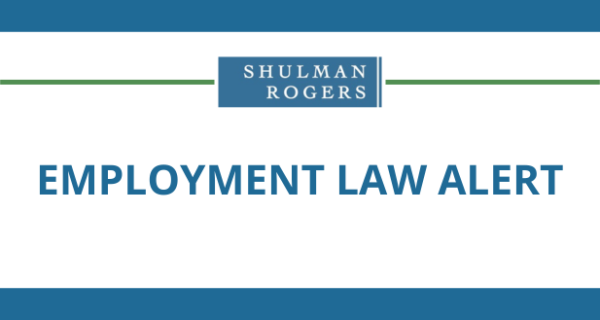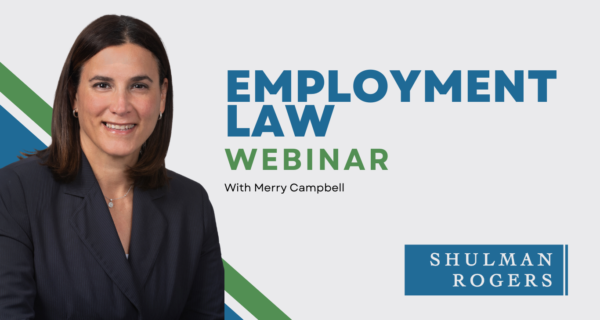
Reliable Employment and Labor Law Practice Serving Maryland, DC and Virginia
At Shulman Rogers, the focus of our employment and labor law attorneys is to help our clients successfully navigate through the increasingly complex and ever-changing landscape of laws affecting their issues. We take a proactive approach to alerting our clients to changes and developments in the law and advising them how to appropriately adapt to these changes. As one long-time client and Chief People Officer shared, “The entire team is on the cutting edge of changes in the laws affecting employment practices and keeps us up to date with emails, training and phone calls.”
We also work closely with our clients to identify and solve their workplace concerns and issues before they become disputes. Disputes, unfortunately, do arise, however, and when they do, we vigorously represent clients in resolving those disputes, including in proceedings before local, state and federal administrative agencies and courts.
Our Clients
We advise and defend employers of all types and sizes, from large publicly-held companies to family-owned businesses, and from the well-established to early-stage and growing entrepreneurial companies. We are experienced in handling the specific and unique issues that each of these businesses face. Our attorneys make the effort to understand a client’s objectives, and work directly with the client to achieve those objectives. Many of our clients have come to us as referrals from existing clients.
Our Strategic Location
Consistent with our strategic location just outside Washington, D.C., Shulman Rogers has established a reputation for in-depth knowledge of not only federal employment law, but also the laws of Maryland, the District of Columbia and Virginia. Our attorneys have extensive experience practicing before the courts and agencies in those jurisdictions. National and international companies with operations in this region retain us because of our local knowledge and experience; other law firms refer clients or work with us because of these capabilities.
Our Cost-Effective Approach
Our broad and diverse employment and labor law practice offers the expertise of “national” or “downtown” firms but at fees reflective of our suburban location and a practical, cost-effective approach in all that we do, whether in counseling our clients or defending them in litigation. We assign attorneys who have the expertise and experience to handle matters effectively and efficiently. We use technology to reduce the cost of litigation.
Counseling, Education and Best Practices
We understand that most employers wish to avoid litigation, and we counsel our clients on preventive measures to help minimize the risk of litigation. We offer advice on day-to-day issues arising in the workplace as well as more complex problems. We assist clients in developing and implementing policies, practices and agreements to avoid liability and comply with workplace legal requirements, including handbooks, hiring documents, employment agreements and severance and release agreements. We develop agreements and policies to protect trade secrets and proprietary information and to prevent unfair competition by former employees. We also provide on-site training to management, supervisors and other employees to help protect our clients against liability and exposure to litigation.
Litigation
Despite preventative practices, litigation is sometimes an unavoidable reality. Our attorneys vigorously represent our clients and actively practice before the federal and state courts and administrative agencies in Maryland, Virginia, and the District of Columbia.
Our Attorneys Counsel Clients and Litigate Issues Relating to:
- Equal employment opportunity, including sexual harassment, discrimination, retaliation, and disability accommodation
- Termination of employment, including reductions in force, and wrongful discharge
- Investigation of and response to harassment claims and other workplace misconduct
- Wage and hour compliance
- Federal and state leave requirements
- Union-related matters before the National Labor Relations Board, including:
- collective bargaining negotiations
- union organizing campaigns
- grievance arbitrations
- picketing
- strikes
- unfair labor practice charges
- Noncompetition, confidentiality, invention and other agreements preventing unfair competition and protecting trade secrets and intellectual property
- Employment agreements for executives and other key employees and related compensation issues such as stock options and other incentive compensation plans
- Mergers, acquisitions and business reorganizations
- Workplace safety compliance under OSHA and other federal and state laws
- Unique requirements applicable to government contractors, including the Service Contract Act, Drug-Free Workplace Act and Executive Orders
- Successfully prosecuted minority shareholder derivative claims, securing favorable out-come, including exit-strategy, for several out-of-state investor clients.
- Secured Permanent Injunctions in the Eastern District of Virginia federal court against former employees and judgments against their new employers, successfully prosecuting breach of contract, trade secret and breach of fiduciary duty claims.
- Negotiated mutually beneficial separations for high-level executives at three publicly-traded corporations based in California, Maryland and New Jersey.
- Equally adept at representing minority shareholders or members in prosecuting derivative (or direct) claims against majority shareholders or controlling members and representing majority shareholders or controlling members in defending derivative or direct claim lawsuits.
- Resolved federal employment claims brought against a large Virginia-based Government Contractor in the Eastern District of Virginia federal court and worked to develop and implement employee training in avoidance of litigation and potential future claims.
- Secured TRO and Permanent Injunction in Maryland federal court against former employees and their new company for a large Virginia-based Government Contractor.
- Negotiated mutually beneficial separations on behalf of two privately held, Maryland-based corporations with high-level executives in California, Massachusetts and North Carolina.
- Successfully defended departing financial advisor group from overbroad restrictive covenants and alleged trademark violation claims – allowing them to seamlessly transfer a very lucrative portfolio to an independent broker-dealer without protracted, costly litigation.
- Resolved claims against and counterclaims asserted by several Maryland-based financial advisors involving their former employer in FINRA arbitration, through successful mediation.
- Successfully defended an employer in a jury trial brought by the EEOC, where the EEOC claimed that a former employee was subject to a sexually and racially hostile environment. After a 7-day trial, the jury found in favor of client and denied the EEOC’s claims.
- Investigated allegation of workplace harassment and advised client on how to avoid future liability.
- Persuaded the Department of Labor (DOL) to significantly reduce fines and settlement obligations assessed in connection with an FLSA audit.
- Successfully defeated harassment allegation on summary judgment that was affirmed on appeal to the Fourth Circuit Court of Appeals.
- Persuaded a federal court to dismiss a discrimination complaint on a motion to dismiss, meaning the client did not have to incur the expense of costly discovery in defending the claim.
- Successfully negotiated a collective bargaining agreement in a contentious situation where the union threatened, but did not implement, a strike.
- Represented management in a successful campaign to defeat a union election.
- Negotiated a complex CEO employment contract through which the organization was able to meet its goals and the new hire felt valued and excited to join the organization.
- Settled wage and hour class action claims on favorable terms, saving the employer from having to declare bankruptcy.
- Defend employer against EEOC charge, resulting in determination that no reasonable cause existed to believe discrimination occurred after a petition was filed with the NLRB.
- Represented employer in union organizing campaign, resulting in an employee vote against unionization. The vote was upheld on appeal.
- Represented employer in unfair labor practice charge proceedings related to employee terminations. NLRB upheld the employee terminations.
- Achieved summary judgement dismissing lawsuit by former employee claiming he was owed payout for accrued but unused vacation and other leave benefits upon termination of employment.
- Won motion to dismiss Fair Credit Reporting Act claims brought by consumer.
- Defended apartment complex management company against housing complaint filed with Maryland Commission on Civil Right and HUD.
















